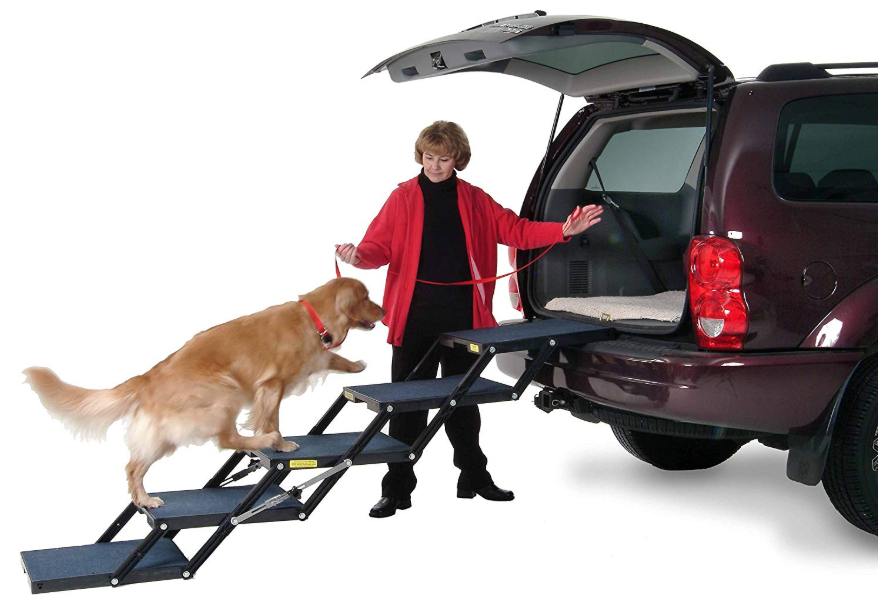
Care For Senior Dogs often need a bit more helps to stay comfortable. Here are a few supplies you may end up picking up to help out your senior canine.
If you need recommendations, consider taking a look at our post about the best dog beds for senior, arthritic dogs.
Recommendations
- Orthopedic Dog Beds. Senior dogs’ bodies are more sensitive, and they won’t have as much cushioning to keep them comfy. Many owners end up purchasing an orthopaedic, memory foam dog bed for their elderly canines to help ensure their comfort.
- Dogs Ramps. As discussed earlier, some dogs may need dog ramps to get up and down stairs or other tough terrains. Ramps are also great for helping larger dogs get into cars without forcing them to jump (which can be painful for older dogs and also exacerbate arthritis).
- Dog Stairs. Similarly, dog stairs may be necessary for dogs that like to sleep on couches or raised beds (or any surface a dog would previously leap up onto). Dog stairs ensure dogs don’t strain their joints or hurt themselves, trying to jump up and down raised objects.
- Dog Potty Pads. Ageing can also affect a dog’s bladder, and your furry friend may have to make more trips to the bathroom than in his younger days. For some owners, that simply means more trips outside, but in some homes, more tours out isn’t a viable option. In those cases, we suggest trying dog potty pads, which let your dog relieve himself indoors (note: there are even dog potty pads using real grass, which dogs love and absorb smells well).
- Dog Lift Harness. Dog lift harnesses can help assist a dog upstairs or on steep terrain. These harnesses strap under your dog and give owners a handle they can use to provide their canines with extra support.
Behaviour, Stress, and Anxiety
As your dog gets older, you’ll find that he gets stressed more quickly and more often.
Separation anxiety and stress is one of the most common behaviour problems seen in older dogs. A dog who has separation anxiety will become very anxious when they sense that the owner is about to leave. When the owner leaves, the dog can become destructive.
Solutions: Work with your veterinarian to discuss any of these behaviours. Your vet will check for a treatable condition to determine the actions. If a cognitive dysfunction syndrome, which may need to treats with medication or training.
In some cases, owners use stress-reducing products like the ThunderShirt or stress-reducing medication or essential oils to calm their pets.
Also, try to learn and evaluate your dog’s stress signals – this can help you become more aware of which situations or objects are stressing your pooch.
Care For Senior Dogs
- Mental Deterioration in Elderly Dogs
Your older dog can become senile as he gets older. You may find him barking, whining, and acting unusual for seemingly no reason. Some dogs will suddenly become distressed without explanation.
One significant component of understanding how to care for senior dogs is dealing with mental deterioration.
Senior canine cognitive dysfunction is a common problem and can be very alarming for owners. Signs of cognitive dysfunction include:
- Confusion or Disorientation. Your dog may get lost in his own backyard, or get trapped in corners or behind furniture.
- Pacing. Pacing and being awake all night, or a change in sleeping patterns.
- Loss of House Training Abilities. A previously house-trained dog may not remember and may urinate or defecate where he usually would not.
- Decreased Activity Level. While decreased activity is every day in senior dogs, unusual lethargy may be a sign of cognitive issues.
- Lack of Attention. Decreased attentiveness or staring into space.
- Lack of Recognition. Not recognizing friends or family members.
- Sundowners. Yup, dogs can suffer from sundowners, just like humans. Owners may see an increased amount of agitation and anxiety in their dogs come evening time.
Treasure The Memories With Senior Canines
Knowing these signs will make things a lot easier for you and your dog as you decide how to move forward. Just remember that, despite how severe seeing cognitive deterioration in your dog can be, you are not alone – many dogs suffer from it.
Watching your beloved pet get older, and witnessing the changes that occur with seniority, can be extremely difficult for owners.
Do not get too down about your dog getting older – if you’re reading this post, you likely care very much for your canine pal and have given him many good years already. You have cared well for your pet.
Do what you can to make your pet comfortable in golden years. Consider an orthopaedic dog bed, certain medications after talking with your vet. And other small things you can do to make life easier. Don’t stress too much about your dog getting older. Instead, use this time to continue to make beautiful memories together.
Cuddle a little longer, eat a bit of bacon, watch the sunset. There’s still plenty of good times ahead with your senior dog, so treasure those times.
